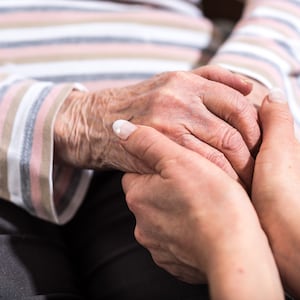Health
Caregiving for Dementia Patients: A Hidden Health Crisis

The challenges of caring for individuals with dementia are underscored by alarming statistics and personal experiences. In her book, The Unexpected Journey: Finding Strength, Hope and Yourself on the Caregiving Path, author Emma Heming Willis highlights a striking fact: caregivers face a mortality rate that is 63% higher than their non-caregiving counterparts, with 30% dying before the individuals they care for. This insight comes as Bruce Willis, the acclaimed actor, faces his diagnosis of frontotemporal dementia, a condition announced by the family in 2023.
The implications of caregiving extend beyond emotional burdens. According to Winifred Henderson, a senior educator at Dementia New Zealand, caregivers often find themselves in a constant state of vigilance. “Generally, the care partners are on 24/7, and that affects sleep quality,” she notes. The toll of fatigue can lead to burnout, making it increasingly difficult for caregivers to provide the necessary support.
Recognizing the demands of caregiving is essential for understanding the broader health crisis it represents. Caregivers frequently sacrifice their own well-being while attending to the needs of loved ones. The lack of adequate rest and self-care can result in physical and mental health complications, creating a cycle of stress and declining health for those who dedicate themselves to caring for others.
A significant aspect of the caregiving experience is the emotional strain. Many caregivers report feelings of isolation and helplessness, compounded by the challenging nature of dementia care. The unpredictability of cognitive decline can lead to frustration and despair, not only for the patients but also for those supporting them.
Support systems play a critical role in alleviating some of the pressures faced by caregivers. Community resources, respite care, and counseling services can provide essential relief and enable caregivers to recharge. Henderson emphasizes the importance of these support networks, stating, “Access to information and practical support can make a significant difference in the lives of caregivers.”
In New Zealand, initiatives aimed at raising awareness about caregiver health are increasingly vital. Organizations such as Dementia New Zealand advocate for better resources and policies to support caregivers. By fostering a greater understanding of the challenges faced, these organizations hope to mitigate the impact of caregiving on health.
As the population ages and dementia diagnoses rise, the urgency to address caregiver health becomes more pressing. Acknowledging the sacrifices made by caregivers is crucial in developing effective support systems.
The journey of caregiving is fraught with challenges, yet it is also marked by moments of profound connection and love. As Emma Heming Willis illustrates through her personal narrative, the experience of caring for a loved one with dementia can be both heartbreaking and illuminating. With increased awareness and improved support, it is possible to enhance the well-being of caregivers, allowing them to continue their important roles in the lives of those they care for.
In conclusion, understanding the complexities of caregiving for dementia patients in New Zealand is essential. By shedding light on the health risks and emotional toll faced by caregivers, society can begin to foster a more supportive environment that acknowledges their sacrifices and needs.
-

 World3 months ago
World3 months agoTest Your Knowledge: Take the Herald’s Afternoon Quiz Today
-

 Sports3 months ago
Sports3 months agoPM Faces Backlash from Fans During Netball Trophy Ceremony
-

 Lifestyle3 months ago
Lifestyle3 months agoDunedin Designers Win Top Award at Hokonui Fashion Event
-

 Sports3 months ago
Sports3 months agoLiam Lawson Launches New Era for Racing Bulls with Strong Start
-

 Lifestyle3 months ago
Lifestyle3 months agoDisney Fan Reveals Dress Code Tips for Park Visitors
-

 World4 months ago
World4 months agoCoalition Forms to Preserve Māori Wards in Hawke’s Bay
-

 Health3 months ago
Health3 months agoWalking Faster Offers Major Health Benefits for Older Adults
-

 Politics3 months ago
Politics3 months agoScots Rally with Humor and Music to Protest Trump’s Visit
-

 Top Stories4 months ago
Top Stories4 months agoUK and India Finalize Trade Deal to Boost Economic Ties
-

 Entertainment3 months ago
Entertainment3 months agoExperience the Excitement of ‘Chief of War’ in Oʻahu
-

 World4 months ago
World4 months agoHuntly Begins Water Pipe Flushing to Resolve Brown Water Issue
-

 Science4 months ago
Science4 months agoNew Interactive Map Reveals Wairarapa Valley’s Geological Secrets









